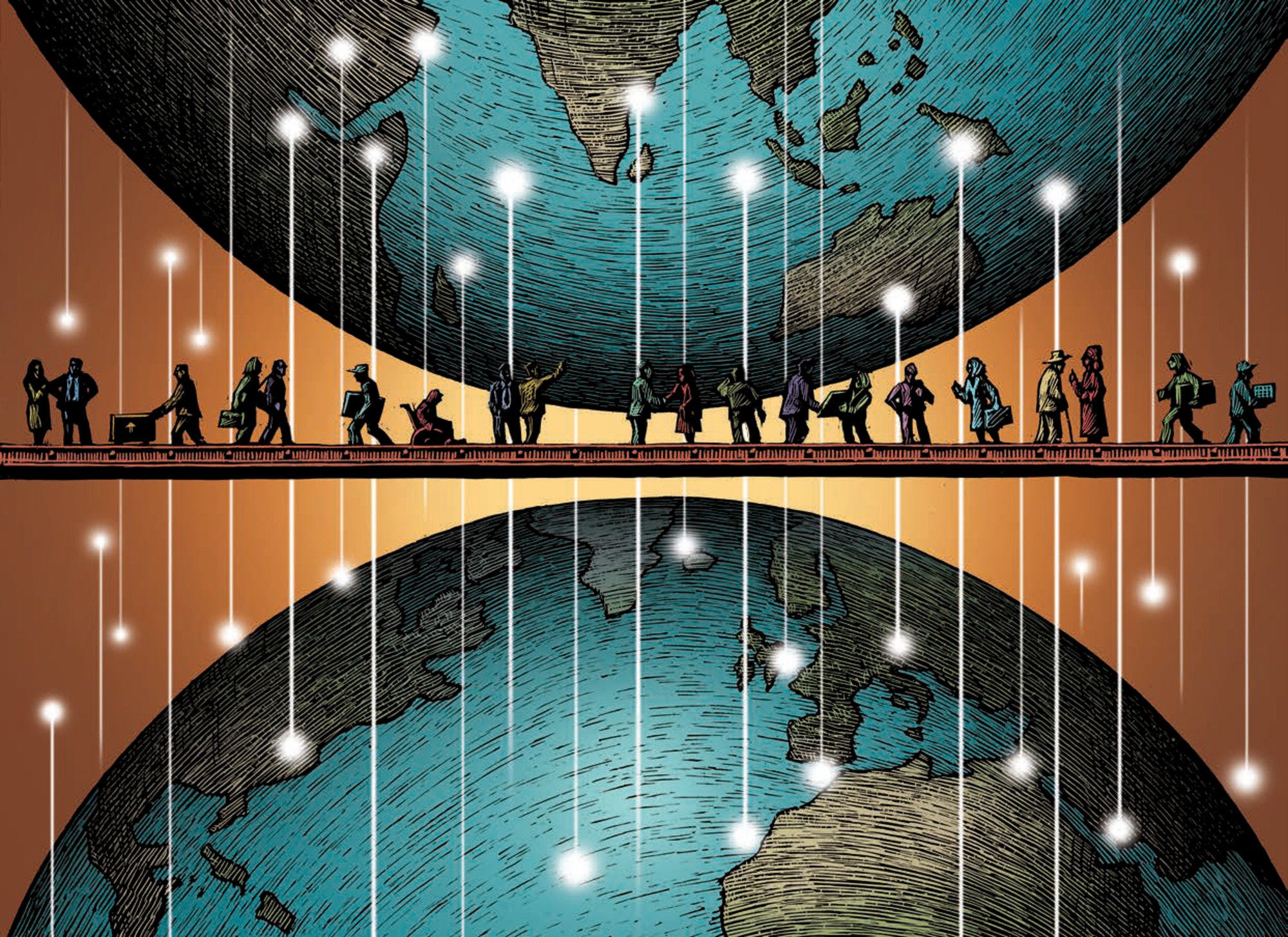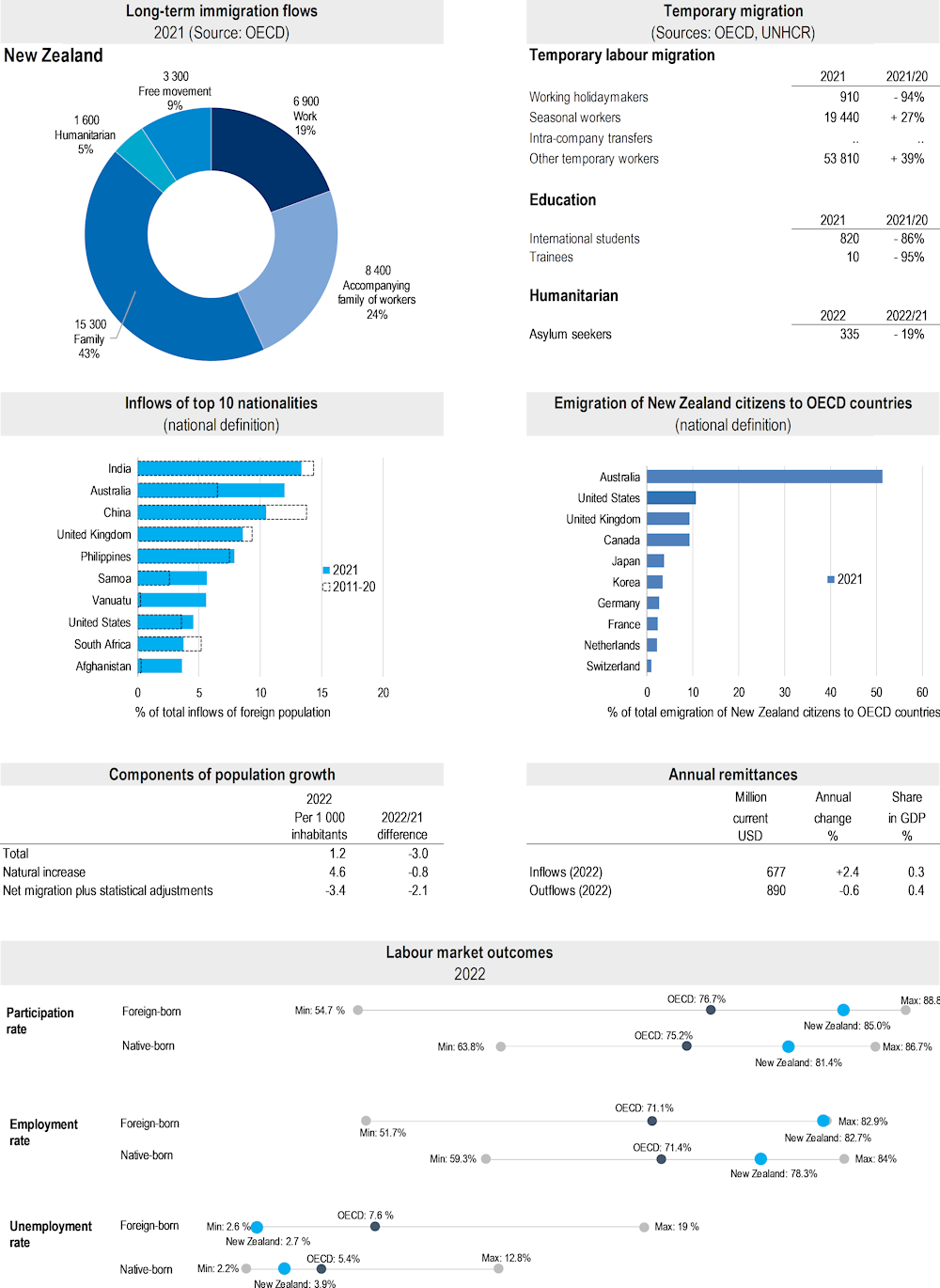In 2021, New Zealand received 35 000 new immigrants on a long-term or permanent basis (including changes of status), ‑0.9% compared to 2020. This figure comprises 9.2% immigrants benefitting from free mobility, 19.4% labour migrants, 66.9% family members (including accompanying family) and 4.4% humanitarian migrants. Around 800 permits were issued to tertiary-level international students and 74 000 to temporary and seasonal labour migrants.
India, Australia and China were the top three nationalities of newcomers in 2021. Among the top 15 countries of origin, Afghanistan registered the strongest increase (+900) and India the largest decrease (‑5 600) in flows to New Zealand compared to the previous year.
In 2022, the number of first asylum applicants decreased by ‑19%, to reach around 300. The majority of applicants came from India (68), China (66) and Malaysia (34). The largest increase since 2021 concerned nationals of Malaysia (+23) and the largest decrease nationals of India (‑72). Of the 590 decisions taken in 2022, 23% were positive.
The “Immigration Rebalance” has remained a feature of New Zealand’s post-COVID response.
Recent data shows a net migration inflow driven by non-New Zealand citizens. Stats NZ has provisionally estimated annual net migration for the year ended April 2023, to be an inflow of 72 300, a turnaround from a net migration loss of 19 300 in 2022.
“Green List” pathways to residence were introduced for highly skilled roles that have been identified as being in demand globally and in ongoing shortage. Alterations were made in May 2023, and further review is underway.
Individuals with post-study work visas for post-graduate/honours study and below can now stay for the same duration as their study in New Zealand. Master’s and doctoral students are eligible for 3‑year visas. Non-degree students will only qualify where their qualification relates to an occupation on the Green List and can only work in a field linked to their study.
Immigration funding was reviewed, and new fee and levy rates were introduced for most visa applications from 31 July 2022. The Active Investor Plus Visa went live to attract investors with capital, skills and international connections to help build high-value New Zealand firms.
The Parent Resident Visa Category reopened in October 2022 with reduced requirements for sponsors and an increased number of places from 1 000 to 2 500 per year.
In early 2023, access to the Victims of Family Violence work visa was expanded to include people on partner-based visas that are linked to temporary migrants. A Migrant Community Reference Group was also established to advise the Minister of Immigration and engage with perspectives from New Zealand’s migrant communities.
An Immigration Amendment Bill was introduced to Parliament in March 2023, to better enable humane and rights-consistent detention of an irregular mass arrival. The government also released an interim response to a 2022 review on immigration by the Productivity Commission, focusing on achieving a longer-term balance between its immigration and broader policy objectives.
In mid‑2023, the government announced that from late 2023, people on an Accredited Employer Work Visa (AEWV) who are not on a pathway to residence will be subject to a maximum continuous stay of five years. Sector agreements that provide limited exception to the AEWV median wage requirements remain in place for tourism and hospitality, the care workforce, seafood, construction and infrastructure, meat processing, and seasonal snow and adventure tourism, to allow a transition away from lower paid migrants. A Sector Agreement for the transport industry was added in early 2023.
The government also announced a simplification of the Skilled Migrant Category (from October 2023). To qualify, an applicant will need to hold either regulated NZ occupational registration requiring at least two years of training, a bachelor’s degree or higher, or earn at least 1.5 x median wage.
The 2022 Special Ukraine Visa now has wider eligibility criteria. Individuals with visas that expire soon can apply for another two‑year visa, to provide certainty about their ability to shelter in New Zealand while the war continues.
For further information: https://www.immigration.govt.nz

